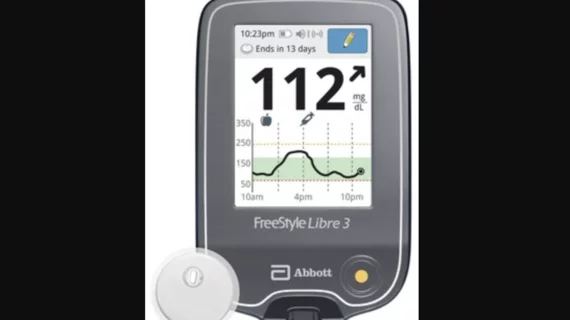Abbott CGM sensors can now be worn during common imaging procedures
The sensors from Abbott’s FreeStyle Libre 2 and Libre 3 continuous glucose monitoring (CGM) systems can now be worn during common medical imaging procedures. This includes X-rays, CT scans and MRI scans, the company announced.
This change represents a step forward for diabetes patients, who face a heightened risk of developing cardiovascular disease or other health conditions that may require medical imaging.
The U.S. Food and Drug Administration (FDA) made the change after reviewing extensive testing performed by imaging specialists. Once the FDA felt Abbott had sufficiently proven the Libre 2 and Libre 3 sensors were still fully functional after undergoing common imaging examinations, the agency agreed to remove the requirement that said these CGM sensors had to be removed in advance.
“For people with diabetes, especially those using insulin, removing a CGM sensor for long periods can be problematic,” Carol Wysham, MD, clinical professor of medicine at the University of Washington School of Medicine and section head of the department of diabetes and endocrinology at Rockwood Clinic in Spokane, said in a statement. “Previously, patients had to remove their sensors during these procedures, resulting in several hours without critical data, especially if they didn’t have a replacement sensor. The removal of the imaging contraindication from Abbott’s FreeStyle Libre 2 and 3 systems is a big win for patients, allowing them to keep their sensors on and avoid lost data.”
“We’ve seen firsthand how consistent use of Libre technology benefits people living with diabetes,” added Anila Bindal, MD, associate medical director for Abbott's diabetes care business. “This contraindication removal aligns with Abbott’s commitment to provide easy, convenient, and affordable technology for diabetes management."
Certain FreeStyle Libre 3 sensors at center of recent recall
Back in September, the FDA announced that ongoing safety concerns with the sensors associated with certain FreeStyle Libre 3 devices had been categorized as a Class I recall. Abbott issued a medical device correction at the time, warning customers and patients that the impacted sensors—from lots T60001948, T60001966 and T60001969—are not to be used. The FDA provided instructions for any customers impacted by the recall.
According to Abbott, the built-in glucose monitor found in each FreeStyle Libre 3 reader was not impacted by these ongoing issues. It can still be used to check a patient’s glucose at any time.

